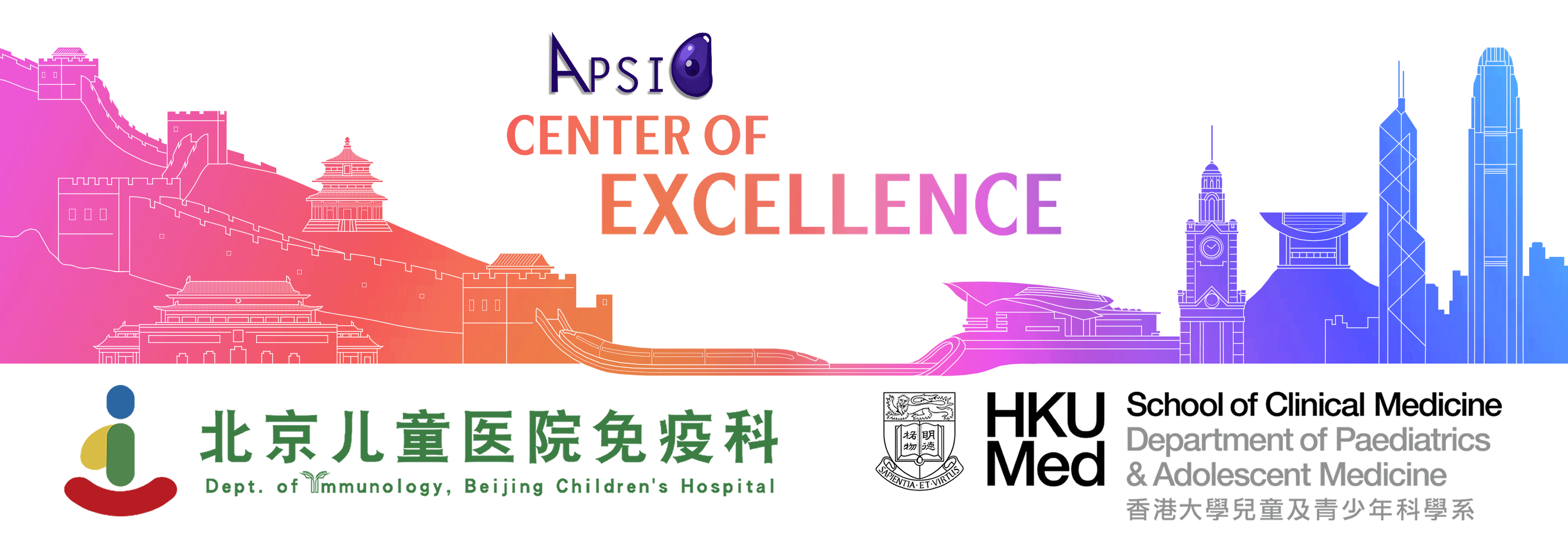APSID-sponsored Fellowship for junior members
Aims of the Fellowship:
- Identify gaps in clinical service, diagnostic/therapeutic procedures or lab techniques in primary immunodeficiency at the home institution (can be clinical or laboratory)
- Identify an APSID Center of Excellence that provides this service routinely
- Targeted learning at the host center to transfer the expertise to the home institution
APSID Centers of Excellence (CoE):
- Department of Immunology, National Center for Children’s Health, Beijing Children’s Hospital, Capital Medical University, Beijing, China
- Paediatric Immunology, Allergy and Infectious Diseases, Department of Paediatrics and Adolescent Medicine, The University of Hong Kong, Hong Kong, China

- Pediatric Allergy Immunology Unit, Department of Paediatrics, Advanced Pediatrics Centre, Postgraduate Institute of Medical Education and Research, Chandigarh, India
(Applicants to this COE are subject to approval by the Deanery of the institute. For Indian candidates, applications from only government hospitals / colleges / institutes / universities are generally approved)

Eligibility:
- APSID member
- Travel visa can be approved
- APSID faculty is present at the host center to supervise the junior member
- Conditions of host institution fulfilled – eg health, travel and ethical requirements
- Specific, Measurable, Achievable, Realistic and Time-bound objectives, with plan and schedule for the Fellowship, set before beginning the Fellowship
This should be drafted by the candidate, and then discussed with the host institution supervising faculty before being sent to the EB for approval
Deliverables - Commitment to setting up required clinical, therapeutic or diagnostic service at the home institution thereafter, for 1 year
This should be written up at the end of the Fellowship, signed off by the host institution supervising faculty and the candidate’s head of clinical department, followed by sending to the APSID Executive Board for review - Presentation of experience and learning points at an upcoming APSID conference
| Proposed format | 3 months (short) | 6-12 months (long) |
|---|---|---|
| Example objective | Laboratory attachment to learn flow cytometry and molecular diagnostic techniques | Research-based attachment to learn how to, and set up APSID registry |
| Clinical attachment to learn how to set up newborn screening programme for PID | Clinical attachment to learn clinical and laboratory diagnostic techniques for PID | |
| Example schedule |
|
|
|
| |
| Total cost (taking accommodation to be USD 750/month, and airfare to be USD 1000) | $4250 | 6 months: $6500 12 months: $11 000 |
Funding will include:
- Airfare: USD 1000 for regional (within Asia), USD 2000 for international
- Accommodation: USD 500-1000 (location dependent)
- Miscellaneous expenditures eg local ground transportation, visa applications, attending conferences: USD 1000
Applications requirements:
- Completed application form
- Complete Curriculum Vitae
- Draft project objectives and plan
- Letter of support from the head of the department

